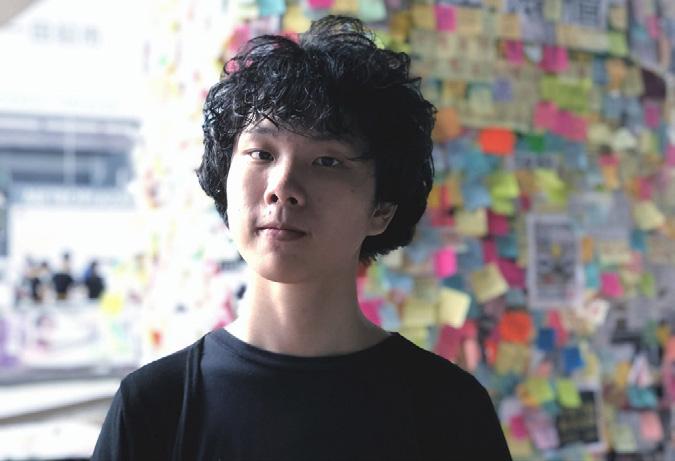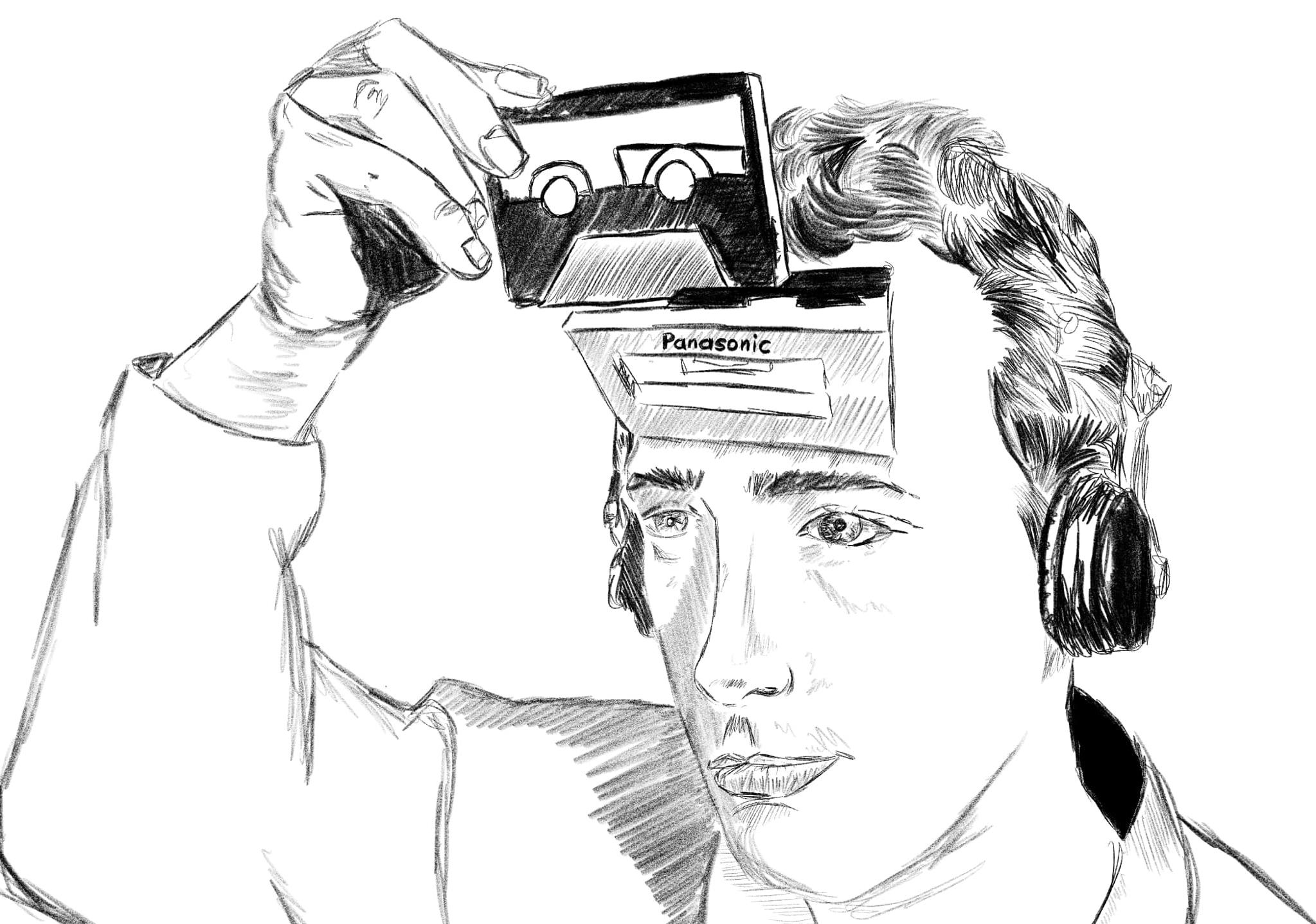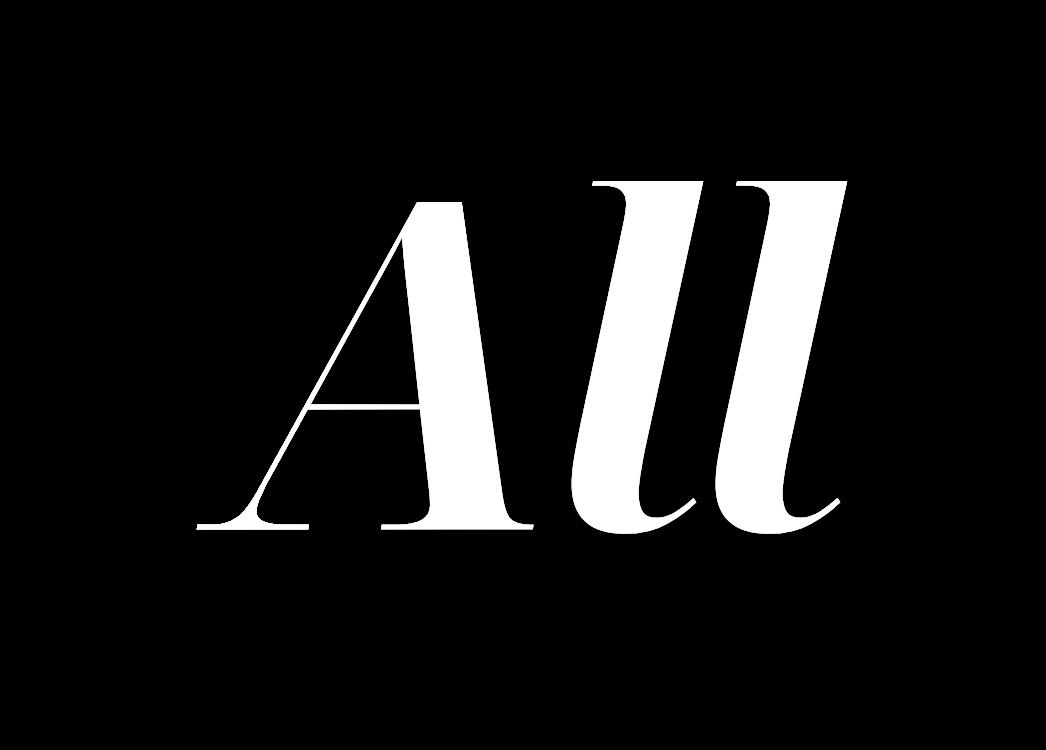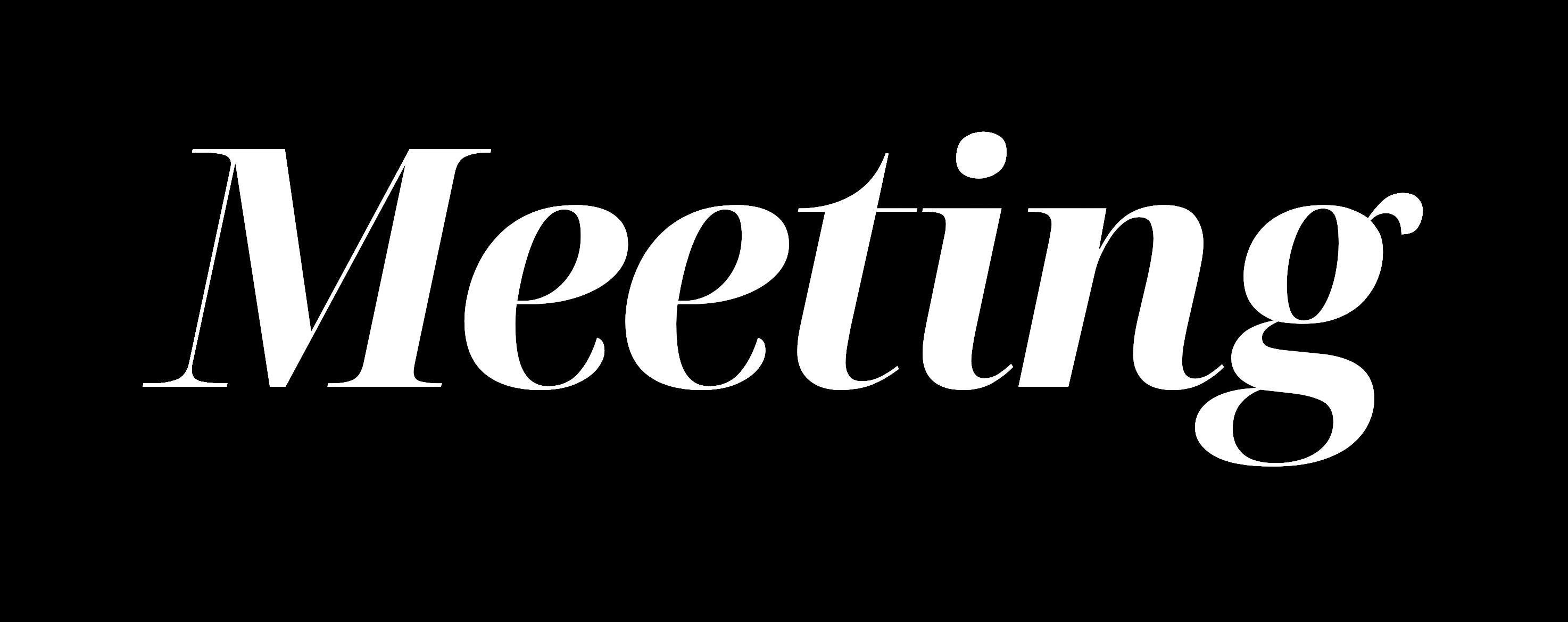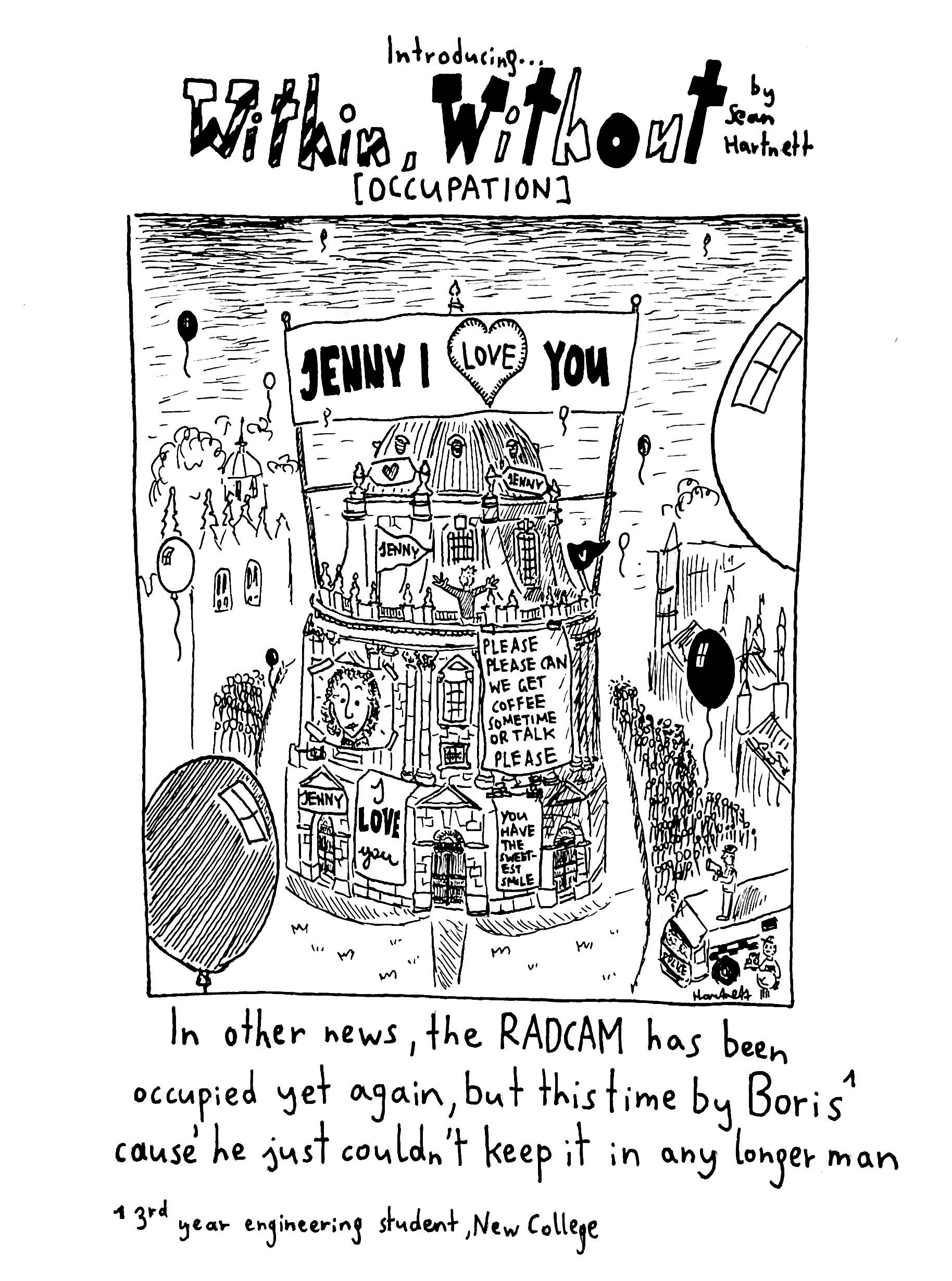O XFORD S TUDENT


Central Oxford was the site of a TV shoot for an upcoming series starring Emma ompson ( Love Actually, Nanny McPhee ) and Ruth Wilson ( Jane Eyre ) throughout the 4th of February. e Bodleian Library, New College Lane, Catte Street and Brasenose Lane amongst others were closed o while pick-ups were lmed. e Apple TV+ drama, called Down Cemetery Road, has been operating under the title ‘Larkin’ to avoid attention from newspapers.
ompson is set to play Zoë Boehm while Wilson plays Sarah Tucker in an adaptation of Mick Herron’s debut novel by the same name, in a “companion piece” to the Apple TV+ series Slow Horses, dramatising Herron’s Slough House novels. Around 20 extras were onsite and nearby a temporary van was seen handing out co ee to students. e bulk of in-Oxford scenes for the lm were reportedly shot last summer while students were away. Unfortunately, the morning sun had turned to rain by mid-afternoon.
On 24 January, student activist group Oxford Action for Palestine (OA4P) occupied the Radcli e Camera library for approximately eight hours. OA4P stated they were renaming the Radcli e Camera to the “Khalida Jarrar Library”, named after Palestinian politician and activist Khalida Jarrar, one of the 90 Palestinian prisoners released earlier in January as part of the cease re deal between Hamas and Israel.
A press release from OA4P, sent to e Oxford Student, stated the group “cannot abide business as usual while the University continues its deplorable nancial and material support, which upholds israeli
occupation and apartheid, and which enabled ruthless israeli genocide in Gaza.”
e release continued: “ e University has shown a clear lack of urgency and resorted to various stalling tactics, despite repeated calls from our broad, diverse, and multifaceted coalition to end its complicity. ese calls have been supported by continued, strategic and targeted actions by pro-Palestine Oxford protestors, including those in OA4P and beyond, as well as numerous student and faculty engagements with ‘o cial’ University channels—engagements that have largely proven to be conducted in bad faith by the University.”
In the early hours of the occupation, protestors had climbed outside of the windows of the Radcli e Camera and used a megaphone to reiterate six de-
mands, including disclosure of University-wide assets and overhaul of investment policy.
A University spokesperson provided the following comment to e Oxford Student: “We thoroughly condemn the disruption and distress caused to members of the University by the actions of these individuals. While the University supports the right to peaceful protest, this action plainly goes beyond the bounds of acceptable protest and is a clear risk to the safety of protestors, students, sta and members of the public.”
Emergency o cials were seen on site with rst aid equipment and University o cials could be seen shouting to the protestors on the window and asking them to step back inside to avoid the risk of falling.
Continued on page 4
As Valentine’s Day threatens to rear its confetti-dazzled head once more, it’s easy to forget that romantic relationships are far from the be-all and end-all of young adult life. In a world that often pits women against one another, strong female friendships stand as a profound act of resistance. ese bonds are more than just emotional connections; they comprise vital
support systems and evolutionary mechanisms that help women navigate the world around them. From gossip to guardianship, the ways women care for each other reveal a remarkable legacy of historical and cultural solidarity that continues to thrive today. Of course, romance has its charm. Starting new romantic relationships can be exciting and challenging; Read the full story on Read the full story on page 17.


Scan this code to receive weekly top stories and more!




No one reads the editorials, so I’m going to write this one like you’re not reading it. While we’re at it, I also think that people should speak like no one is listening. Partly, because it shocks people to start listening and partly because it’s fun. Over the last few weeks, I’ve been to more events than my social battery could sustain, to now feel like I am completely drained. Having exhausted journalistic small talk, and asking people, “so, what do you study?”, I’ve moved on to ask them about growing up on a farm as a communist or what parental guidance could have possibly led them to be this unsuitable for societal interaction. I had the most


Student journalism is a ckle beast. Taking over the lives of those who are involved in it and universally scorned by all others (many a friend has been brought back from a self-es-
exciting interview a couple of days ago, where I did blatantly ask my esteemed interviewee some contentious questions, including whether he might have ADHD. Relieved that he did take it in jest, it led to interesting conversation when he would ask his secretary to not interrupt us and give us more time to chat.
I am pleased to be working with a team that genuinely cares. To all of the people that came to lay-in and stayed until the end, and even after I’d left to create this stunning (I’ll say it) newspaper - thank you. We share the passion of doing something we care about and doing it well, and I’m hopeful to see this carry on for the rest of the term! As for everyone that isn’t a part of the team, you can still come to our events, submit commissions (check our link in bio), or corner us on the street for a chat. Since you’re not reading this, of course, I appreciate the lack of cornering.
teem crisis by the words “at least you don’t write for the [CENSORED]”), it can be hard to get into and even harder to leave. Having hopscotched the length of Oxford publications in my years here, I know more than is healthy about most things student journalism (and no things PPE, as my tutors will con rm). e Stu has welcomed me, a refugee from the depths of despair (student politics), with open arms: Ananya, Georgie, Eleanor, and Caitlyn have managed to assemble one of

Recently I’ve been having what I dub “weekends”, weekdays on which I do no work and fa! around with things for this newspaper. A lot has happened since the last print; above all, the big round library in the middle of town (the name has been changed) was taken over by protesters for Palestine in a masterfully businesslike way. So it was that this circular building was surrounded by a circle of onlookers right in the centre of this large circular city. Most of the questions about this sudden ambush were directly answerable. Who was it? ey’ll happily tell you. Please can I go in and get my book? No, choose another library. But there was one last question waiting in the brickwork. How in Christ’s name did it take the police so long to abseil down? Were they scared to fall? What if it was their rst time bungee jumping? Whatever they were doing up there, it was pleasantly melodramatic when they did start lowering themselves down (c.f. our photos). And look at the Oxford-Cambridge ‘growth tunnel’. Apparently we’re sinking 78bn on a way to allow Oxford students to go to Cambridge without even setting foot on terra rma (London soil). It is a great literalisation of the Oxbridge pipeline. e southwest bubble has become even more of a shiny little soap bubbleperfect, scented and sanitised. A few opinions. e new hipster shop next to Objects of Use is copying the font but the ceramics aren’t cutting the mustard. I don’t like Oxfess because I only like my own opinions. I like e Grapes. e Grapes does for me what paint does for those people who drink paint.
the most capable, creative, and loveliest teams I’ve ever worked with. So, whether you are a fresher wanting to put your wide-eyed thoughts on the Oxford experience on newsprint, or a seasoned veteran who would rather bring said wide-eyed fresher down to earth than revise for nals (hi!), there is no better way than to get involved in the Stu. Pitch us an article, apply to work on the Strategy team, or join as a Section Editor. But if you’re happier on the other side of a by-line, this edition
of the Stu - with mysterious lm shoots, tales of tearful formals, and Melania Trump’s private scribblings - should be enough to see you past the middle of the Horrible Hilary and closer to Trini-free’s mirage of punts and picnics.

On Monday, Judge eodor Meron visited Trinity College to commemorate Holocaust Memorial Day, 80 years after the liberation of Auschwitz-Birkenau concentration camp. His lecture was titled ‘ e Mystery of the Holocaust.’
Meron is a leading scholar of international humanitarian law, human rights, and international criminal law. He has served as an international judge for United Nations international criminal tribunals, including for the former Yugoslavia and Rwanda. He has also been a legal advisor to the US and Israeli state departments. In 2024, he was part of the expert panel which unanimously agreed there were reasonable legal grounds for the ICC to pursue arrest warrants against Hamas leaders Yahya Sinwar, Ismail Haniyeh, and Mohammed Deif and Israeli politicians Yoav Gallant and Benjamin Netanyahu on charges of war crimes and crimes against humanity.
Aged 94, Meron was born in Poland to a Jewish family and held in a Nazi labour camp during World War Two. After expressing his surprise at the high audience turnout due to the wind and rain, Meron began by emphasis-
ing the unfathomable nature of the Holocaust. Despite his long career studying the mechanisms of genocide, he declared: “I am still at a loss trying to understand [the Holocaust].”
He explored the facilitating factors of the “bureaucratically-run death machine,” notably the moral complicity of bystanders and the role of propaganda in completely dehumanising the Jewish people.
On ursday, the Oxford Union held its second debate of the Hilary Term, debating the proposition, “ is House Believes that Liberal Democracy has Failed the Global South.” e resulting vote was 184 Ayes to 145 Noes, meaning the Union concluded that liberal democracy has failed the Global South.
accused proposition speaker Professor Ahsan Iqbal and his government of hindering democracy in Pakistan by rigging elections; Iqbal cited India as an example of a Global South country where democracy was allowed to thrive and helped the economy prosper as a result.
MP O’Hara was the rst guest speaker on the proposition’s side. He accused Western nations of allowing liberal democracy to fail due
Meron strongly argued that the danger primarily lies in a regime’s ability to make a genocide appear banal: “Hitler proceeded step by step wanting to make sure that the German public was supportive or at least indi erent.”
He demonstrated that in societies where people are alert to the preaching of religious and ethnic hatred, such as Denmark during the Second World War, campaigns of dehumanisation cannot be as effective and there is less social
stigma around speaking up for the persecuted. For instance, Denmark crucially transported its entire Jewish population to Sweden, saving them from the Nazis.
He commented that “murders of the scale of the Holocaust are not possible when the body politic stands up” and that those “who averted their eyes” bear a heavy moral responsibility. He declared: “yes, there are situations where silence equals complicity.”
However, Meron also highlighted those thirty thousand non-Jewish people who have been recognised as ‘Righteous Among the Nations’ by Yad Vashem, Israel’s Holocaust Memorial Center, for their role in standing up for and saving Jewish people during the Holocaust, whom he admires for “their shared perception of a common humanity, their readiness to swim against the current.”
He advocated for the importance of not shying away from atrocities as, in his words, “coming clean with the past is essential to historical reconciliation.” He stated that he admired former French President Jacques Chirac for admitting to Vichy France’s role in the Holocaust.
Read the full article online at www.oxfordstudent.com
Supporting the proposition were Member of Parliament (MP) Brendan O’Hara, Federal Pakistani Minister of Planning, Development and Reform, Ahsan Iqbal, and Professor of Economic Policy Professor, Stefan Dercon.
Forming the opposition was Luxembourg’s Ambassador to the UK and former Ambassador to the European Union, Georges Friden, former US Ambassador, Kurt Volker, and Professor of International Law, Surya P. Subedi. e proposition began with Union member and Secretary’s Committee member Arwa Elrayess of St. Edmund Hall arguing that the ideology of liberal democracy has been used as a tool of Western domination, empire, and hegemony over the Global South. Opening for the opposition, Union member and Press O cer Asad Iqbal, argued that liberal democracies in the Global South had been “deliberately sti ed by local elites and foreign powers.” He
to their “complacency, arrogance, and sel shness.” He asked why Western democracies should be shocked at countries in the Global South allying with Russia, China, and Iran, as authoritarians were exploiting existing faults in liberal democracy. Arguing that Western nations never got out of the colonial mindset, O’Hara argued that liberal democracy has failed because Western nations have failed to defend it.
Professor Ahsan Iqbal argued that “liberal democracy was sold as a golden ticket to the world” to “elevate nations from poverty and unlock prosperity.”
Read the full article online at www.oxfordstudent.com
e Oxford Union chamber. Credit: e Oxford Student

Sumrah Akhtar
Oxford City Council have announced plans to introduce a council tax premium charge of 100% on second homes.
e Council’s Audit and Governance committee gave the plans the green light at their 20th January meeting as part of setting the council tax base for 2025-26.
Roughly 668 homes within the city will now have to pay double the standard rate.
Speaking after the meeting, Council Deputy Leader Ed Turner stated that the goal is to “make Oxford a fairer place to live” and that if people are lucky enough to have a second home in Oxford, “it’s only right that they make an appropriate contribution for local services.”
e premium charge was approved in February 2023 and was originally set to be introduced in April 2024. However, after orders from the government that at least 12 months notice had to be given to those a ected, the extra charge was delayed until April of this year.
Oxford is not the only council that is introducing novel tax measures on speci c types of property owners. Wandsworth Borough Council, which has a long standing reputation for paying the lowest council tax in the country, are preparing to target foreign investors who are buying London properties and leaving them vacant. is trend appears to be increasingly popular amongst local councils.
Deputy Leader Turner stated in a comment to e Oxford Student that the council aims to collect this tax as soon as possible.
By 10:00 AM, ames Valley Police were on site and a make-shift barricade of chairs and tables could be seen behind the front door of the Radcli e Camera.
e Oxford Student spoke to Jack, a student from Hertford College, who was standing outside of the Radcli e Camera. He stated that while he was “sympathetic to the cause”, he believed the protest “achieves nothing”. “People are going to hurt themselves.”
A sixth-form student who runs the Palestinian solidarity Instagram account @oxschool4pal, told e Oxford Student: “I think it’s a really interesting way to get the point out. Yeah, there’s a ‘cease re’, and we can put that in air quotes, but Israel’s still bombing Palestinians and still killing children.” “It makes sense that they’re up here right now ghting for Palestine… because there’s loads of people who are coming by and who don’t know nothing about it.”
By 12:00 PM, ames Valley police o cers with yellow vests had entered the Radcli e Camera. Protestors began gathering outside of the Radcli e Camera and chanting: “One, two, three, four, occupation no more. Five, six, seven, eight, Israel is a terror state.” “[Vice Chancellor] Irene Tracy, you can’t hide. We charge you with genocide.”
Protestors also chanted: “Yemen, Yemen, make us proud, turn another ship around.” referring to the Houthi political and military organisation, which controls some territory in Yemen and has launched aerial attacks on international maritime tra c in the Red Sea in response to Israel’s invasion of Gaza. “Resistance is justi ed, when people are occupied.”
One of the protestors at the window of the Radcli e Camera, in an apparent response to the chants, stated: “We should remember that today we have made the very heart of the University of Oxford
Palestinian.”
At 1:59 PM, ve police abseilers were seeing entering the Radcli e Camera from its south entrance with climbing equipment. Within the next hour, police had climbed on to the top balcony of the Upper Radcli e Camera and dropped a rope to the protestors sitting outside the window. Police began abseiling down to the window and tied harnesses to the protestors, who did not show signs of resisting. Protestors from outside the Radcli e Camera began cheering when one police o cer and protestor reached the ground. At approximately 3:40 PM, protestors who has been chanting outside and police engaged in a brief physical confrontation. By 4:30 PM, all protestors on
ed a University-wide review of our investment policies to ensure alignment with ethical standards. Additionally, we engaged with students on racial and religious inclusion in Michaelmas term 2024 to strengthen our commitment to equity and diversity across our community. We have commenced a review of the current prohibition on direct investments in companies manufacturing arms that are illegal under UK law as well as investment in funds which invest primarily in such companies. Given the range of stakeholders, this necessarily takes some time, but it is proceeding at pace and is on track to conclude by the end of this academic year.”
e next day, Oxford Action for Palestine released a statement on the arrest of the protestors, including the following sections:
“On the International Day of Education, a group of OA4P actionists occupied Oxford’s most famous building, formerly the Radcli e Camera, renaming it ‘ e Khalida Jarrar Library’, after the newly-released Palestinian political leader, activist, and scholar Khalida Jarrar.
the window of the Radcli e Camera had been abseiled down to the ground by the police o cers and taken into the building and arrested.
At 5:50 PM, a University spokesperson provided the following statement to e Oxford Student: “In light of the Radcli e Camera occupation and allegations by the protesters regarding the progress the University has made on its commitments below is an update.” “To support those a ected, the University has introduced the Palestine Crisis Scholarship Scheme for displaced students from Gaza and the West Bank, strengthened fellowships for at-risk academics through CARA, and expanded access to educational resources for Palestinian universities. e University has also accelerat-
expending city and University resources in the process.”
e Bodleian Libraries, the group of University of Oxford libraries, announced on Saturday that the Radcli e Camera had re-opened.
“Despite initially agreeing to discuss with actionists, University Proctors shortly thereafter threatened disciplinary action and called in police forces to evict the actionists.
e University deployed at least a hundred security and law enforcement personnel to forcefully arrest actionists and use physical violence on protestors outside the library,
On Monday 27 February, the University of Oxford sent an email to students regarding the occupation on Friday, including that all 13 protestors who were inside the building were arrested, and only one is a current Oxford student who will be “subject to [the university’s] disciplinary processes.”
e email continued: “While the University supports the right to peaceful protest, this action was disruptive and dangerous. It presented a clear risk to the safety of protestors, students, sta and members of the public.”
“We remain committed to ensuring that Oxford is a welcoming and inclusive place, and one in which we express ourselves through robust, civil debate.”

Botley Road will nally reopen to all tra c in 2026, Network Rail announced last week.
e £161m bridge replacement project was initially due to be nished in October 2024, with a brief pause from October 2023 to March 2024 to allow tra c to pass through. is pause did not happen, and as a result, the Botley road has been closed for almost two years. e new August 2026 re-opening date represents a 22-month delay from the original plan.
sons. Problems with sewage required the intervention of ames Water, and the discovery of an inverted Victorian brick arch delayed construction further.
Since Botley Road rst closed
dents and employees.
A student from Oxford who lives in Botley told e Oxford Student that the closure has made the journey to the city centre longer and more expensive, especially when using a taxi or bike. ey also said that the tunnel provided by Network Rail to ensure pedestrian access to Oxford City Centre “doesn’t feel the safest, especially at night”.

According to Network Rail, the project had to be delayed because of a multitude of rea-
in April 2023, both businesses and residents in the area have been a ected. e 2 minute drive to Oxford City Centre was extended to a 20-minute one, requiring residents to not only travel on the dual-carriageway A34 but also drive through either Summertown or South Oxford. Additionally, the A34 often experiences rush hour delays, making commuting tough for the resi-
Once, the Fourth Estate—the press— stood as a check on power, journalism was recognised as an o cial yet essential pillar of democracy. Media moguls like Rupert Murdoch, for all their in uence, at least played by the rules of the old game—exerting political in uence under the cover of journalistic integrity. e new media titans make no such concessions.
Elon Musk has rewritten the rules, moving from in uence to outright control. He has bought himself a seat at the table of political discourse and he doesn’t just in uence the conversation—he owns the platform it takes place on. e Fourth Estate, awed but essential, is giving way to a Fifth Estate—one driven by private power, free from scrutiny and serving the interests
Additionally, sta at Waitrose Botley Road have mentioned multiple changes since April 2023, such as reduced foot tra c and reduced sales week-on-week compared to 2
years ago, as well as a reduced delivery revenue due to deliveries being passed on to other branches.
Network Rail has o ered some support for residents and businesses, including a free bus service to the centre 5 days a week. Pedestrian access to businesses in the area from Oxford City Centre will also be expanded, including extra lighting for the pedestri-
an tunnel, by Summer 2025. Marcus Jones, Network Rail’s Western route managing director, said: ““We’re extremely sorry for the impact the road closure is having on the people of Oxford.”
Additionally, the Minister of State for Rail, Lord Hendy, said that he believes there is “light at the end of the tunnel” for residents and businesses.
of the few over the accountability of the many.
For decades, media moguls have shaped British politics through control of the press, engineering headlines to shape public opinion and tilt elections in their favour. Murdoch’s e Sun helped deliver atcher, Blair and Brexit with front-page endorsements and relentless editorial campaigns. e Daily Mail courted the far right under Rothermere, and the Barclay brothers positioned e Telegraph as the ideological stronghold of Conservative politics.
ey understood that newspapers weren’t just about informing the public—they provided a platform for political persuasion. But for all the in uence, they still operated within the bounds of journalism, however loosely de ned.
ere were editors, regulations and at least the expectation of accountability. Objective truth was a recognised value, able to exist aside from the idea of the free press.
Musk has no such pretence. He doesn’t need to cultivate relationships with journalists or shape stories behind the scenes. With X, he has sidelined the old media gatekeepers, inserting himself directly into political debate.
He ampli es climate scepticism, dismisses fact-checking as censorship and provides a direct line for gures like Nigel Farage, who would usually operate at the margins of policy debate, to spread their ideological message. His endorsement of Germany’s AfD and staunch support of culture-war narratives, however, show that his ambitions go far beyond policy detail. e
Fourth Estate, for all its aws, was still tied to some form of scrutiny—both legal and moral. Musk now operates beyond the ‘legacy media’— setting the terms of public discourse on his own, with no obligation to truth, nuance or accountability. Why then, has his attention shifted to the British political sphere?
e South African-American billionaire has tweeted extensively about the Southport killings, ‘rape gangs’ and the jailed far-right activist Tommy Robinson. He has compared Kier Starmer’s attitude to censorship to that of the Soviet Union, describing his government as repressive and tyrannical. But, Musk’s ght against regulation is not about defending free speech. Read the full article online at www.oxfordstudent.com

Every year, when the rst new moon in the lunar calendar rises, millions of families across East and Southeast Asia gather to make dumplings and watch the Spring Festival Gala on television next to a feast of sh and signature Chinese dishes. But what do Oxford students from East and Southeast Asia and around the world do on this occasion?
Over the past week, the Oxford community rang in the Year of the Snake in their own unique ways. Celebrations include themed college events, large-scale performances, festivities organised by the Oxford Union and cultural societies, and informal gatherings with friends. e Oxford Student interviewed a few societies and students who attended these events to learn about their perspective on what it is like celebrating Lunar New Year in a home away from home.
The University of Oxford has attracted criticism following the announcement of potential changes to exams and assessments for students.
e announcement came as part of the University’s Access and Participation Plan, rst released in September 2024.
e Plan is just one example of similar initiatives being conducted by other Russell Group universities. According to the o cial document, the University aims to promote “equality of opportunity for underrepresented groups.”
is would include admitting more students from “socio-economically disadvantaged backgrounds” and helping more students with “certain characteristics” achieve a 2:1 classi cation or higher in their degree. By the 2028/29 academic year, the University aims for 94% of Black students, disabled students, and those eligible for free school meals, to achieve a
“good degree.”
Additionally, measures such as more “inclusive” assessments have been proposed. ese could include openbook examinations or takehome papers, rather than the traditional practice of in-person, closed-book examinations. e prospect of introducing such measures
calling these adjustments “anti-meritocratic nonsense.” Ms Truss attended Merton College, Oxford, as an undergraduate studying PPE (philosophy, politics and economics).
these situations. Some people come to this university having been prepared for (exams) since they started education, and so of course there’s going to be some inequality there.”
has been given the green light across many institutions. It has, however, attracted some scepticism.
In recent weeks, media outlets have accused universities like Oxford of “dumbing down” examinations for the sake of inclusivity. Former UK Prime Minister Liz Truss also released a statement on the social media platform X,
e announcement of potential exam adjustments corresponds with concerns of a student mental health crisis, with around 1 in 6 university students struggling with forms of anxiety and depression. Oxford students are not immune to such pressures, and the competitive, fast-paced nature of examinations can be overwhelming for some. One student explained their views on more “inclusive” assessment methods to e Oxford Student: “I think there’s de nitely some merit to the proposed changes. e amount of in-person examinations with Prelims, Finals and even collections can be a bit daunting, and the University doesn’t really acknowledge how students from certain backgrounds can face setbacks in
A 2023 report from King’s College London suggested that mental health problems are more frequently seen in students coming from state
school education, who are on average 30% more likely to experience such issues than their private school counterparts.
A University of Oxford spokesperson told e Oxford Student: “Oxford’s plan outlines the University’s ongoing commitments to support undergraduate candidates with the highest potential, from all
backgrounds, to make strong applications to Oxford, and to support all of our students once they are on course. Speci cally, in the coming years we will continue our access and outreach work to increase the number of students from socio-economically disadvantaged backgrounds admitted to Oxford, and will put in place additional measures as part of our ongoing programme of on course support with the aim of supporting speci c student cohorts to achieve good degree outcomes.”
e exact timeline in which students can expect any proposed measures to be introduced is still unclear.
The Chancellor has claimed that proposals to link up the cities of Oxford and Cambridge via a Growth Corridor will have the potential to contribute up to £78 billion to the UK economy by 2035.
Chancellor of the Exchequer Rachel Reeves spoke at Siemens Healthineers in Oxfordshire on 29th January 2025. In her speech, she outlined several initiatives to drive economic growth across the UK. Speci cally, she announced plans to turn the cities of Oxford and Cambridge into “Europe’s Silicon Valley” through the construction of an Oxford-Cambridge Growth Corridor.
She explained: “Oxford and Cambridge o er huge potential for our nation’s growth prospects. Only 66 miles apart, these cities are home to two of the best universities in the world, and the area is a hub for globally renowned
science and technology rms.”
“ is area has the potential to be Europe’s Silicon Valley.” e plan entails funding for improved transport links between both cities, including new services between Oxford and Milton Keynes starting this year and road upgrades to reduce journey times between Milton Keynes and Cambridge.
Other changes include improvements to infrastructure and public services to support the growth corridor as it expands.
“With central government, local leaders and business(es) working together, the Oxford and Cambridge Growth Corridor could add up to £78 billion to the UK economy by 2035, driving investment, innovation and growth”, she added.
Vice Chancellor of the University of Oxford Irene Tracy said in a statement that the plans would “unleash the potential of the Oxford-Cambridge growth corridor” as “the Oxford-Cambridge re-

gion is a powerhouse of innovation and an economic crown jewel, driven by world-leading universities that spin-out as well as attract globally pioneering companies.”
“As a supercluster, we create thousands of jobs and attract millions in investment that bene ts local and national efforts for growth and prosperity through partnerships, such as that between Oxford and Birmingham. Our e orts additionally bring transformative societal and health bene ts that go beyond life sciences and tech with our recognised
strengths in the creative arts and humanities.”
e Chancellor has appointed Lord Patrick Vallance as the growth minister for this project.
“Lord Vallance has extensive experience across the sciences, academia, and government,” she stated.
Lord Vallance, who was key in developing the country’s response to COVID-19 during the pandemic, has recently reected that he was in a hurry “to get things done” and felt “pressure” to “make stu happen”.

South African Minister of International Relations and Cooperation Ronald Lamola covered a breadth of international relations topics in his address to the Oxford Union on Monday evening, including the escalating conict in the Democratic People’s Republic of the Congo (DRC), whether South Africa would arrest Russian President Vladmir Putin should he
enter the country, and how he views China’s expanding relationships with African countries.
e event was delayed by more than one hour due to an emergency meeting Lamola participated in with other heads of state of Southern African countries to discuss the ongoing situation in the Democratic People’s Republic of the Congo (DRC), where a Rwandan-backed rebel group has gained control of parts of
the country’s territory leading to large scale displacement and civilian casualties.
Lamola described the ongoing situation as a “huge international embarrassment” and called for both Rwanda and the DRC to resume dialogue. irteen South African peacekeepers, who were deployed as part of peacekeeping missions in the DRC, have died since the escalation of the con ict last week. Lamola stated that peace and prosperity in the DRC can only “come from a political solution and not a military one.”
Lamola also spoke of international law being “violated with intense impunity” in Gaza and Sudan. He added that the ‘Global South’ countries “were taught by liberal democracies about the rule of law [and] we expect them to comply.” South Africa has had an increasingly visible role on the international stage in re-
cent years, including bringing a high-pro le case against the State of Israel before the International Court of Justice in 2023, alleging Israel’s actions in the Gaza Strip amounted to genocide. Speaking about the case, Lamola remarked, “there must be respect for the rule of law and consequences for genocide.”
Lamola described BRICS as an “important game changer” and “counterbalance” to existing institutions and has helped provide South Africa with additional nancing for development and infrastructure.
Union President Israr Khan posed a question on China’s alleged practice of ‘debt-trap diplomacy’, Lamola responded that African countries’ relationship with China is mutually bene cial and countries always seek to negotiate favourable terms for conditions of debt.
On 22nd January 2025, the Oxford City Council voted to approve a three-yearplan to help refugees and asylum seekers. is led to the accreditation earlier this month, with Oxford joining Birmingham, Bristol, Liverpool and Manchester in becoming a “local authority of sanctuary”.
e plan comes as part of Oxford City Council’s commitment to providing support for refugees. 58 refugee families have been resettled since 2015, when the council committed to settling 8 families per year. Additionally, in 2024, the council coordinated with the Homes for Ukraine scheme, helping 70 resettled residents in Oxford access English tuition.
e plan involves “empowering the local community” to support the refugees. It aims to work with local volunteers to help refugees pick up English as well as important skills for the workplace, and provides low-cost and free food for refugees who want help.
Additionally, many council institutions, including GP surgeries and libraries, will become “registered places of sanctuary”. Refugees will be encouraged to participate in the cultural life of Oxford, and the council also aims to translate the council’s website into multiple languages over the coming years.
e plan will be nanced by existing grants from the government for refugees and asylum seekers.
e council believes that this plan will bene t existing Oxford residents by helping to “ ll current labour shortages” and “diversify local industries”.



Daniel Oberhausvia Wikicommons
Who is really in power? What kind of a world do we really live in?
As is the nature of politics, we all inevitably end up asking ourselves such questions from time to time. We are always throwing around terms like ‘Democracy’ and ‘Self-determination’, but we do not spend as much time thinking about what these words actually mean.
So, how can we de ne the ‘_cracies’, the systems of government which make up the world? What can be said about the present state of global politics? Which of these systems have we moved on from, and which are becoming an evermore present reality?
In this rst article of my column, the ‘_cracy’ of the day is ‘Plutocracy’. It is de ned as a system of rule by the wealthy, either directly or, importantly, indirectly. is is not the most commonly used term, but in the developing political climate, it is one of utmost importance.
On a mere surface-level examination, it’s very easy to see how systems of government in recent years have been run by wealthy people. Concerns were raised in 2017 over eresa May’s cabinet, which housed “plenty of multi-millionaires”. For a more extreme example, we might look over-
seas to the US, where Trump has assembled a cabinet of billionaires, with a net worth that far surpasses that of his previous cabinet.
Moreover, many were shocked to see a “parade of tech billionaires”, that included Je Bezos, Mark Zuckerberg and Tim Cook, at Donald Trump’s inauguration as President. e most prominent member of this group is Elon Musk, who is tasked with chairing the new Department of Government E ciency. His net worth is now estimated to exceed 400 billion dollars.
Minister Rishi Sunak was estimated to have a net worth of over 650 million pounds. During his time in o ce, he was constantly accused of being out of touch with the general population, at a time when the UK was “enduring the worst cost-of-living crisis in memory”.
e issues arising from a ‘plutocratic’ society go further than simply the idea that our MPs might not know how to use contactless. Concerns can be raised as to the priorities of a government run by the rich.
lice departments”. e White House claimed the Medicaid program, a system which “provides healthcare to millions of low-income Americans” was exempt from the cuts. However, there were reports of a number of doctors and hospitals who were unable to access the Medicaid payment portal. Although the order has since been rescinded, Trump’s campaign to cut costs is far from over.
wealthy tech entrepreneur are highly involved in politics. In the recent US election Musk was Trump’s biggest donor, giving the Republican campaign at least a quarter of a billion dollars. Furthermore, it has been suggested that
So, what are the concerns behind a system of government run by the rich? Many argue that in a ‘plutocracy’, the needs of the working class will be neglected in favour of concentration “on the goals of the wealthy, creating even more income and asset-based inequality”. Many politicians’ personal wealth exceeds that of the average person by a signi cant amount. So it’s not hard to see how they might have a hard time getting to grips with the reality of the general public.
For example, former Prime
In November of 2023, Rishi Sunak’s cabinet considered cutting working-age bene ts spending by around 3 billion pounds. e purpose of this move was to cut inheritance tax, even whilst the Institute for Fiscal Studies reported that at least half of the bene t from abolishing inheritance tax would be enjoyed “by people inheriting estates of £2.1m or more”, raising questions about the Conservative government’s priorities. Learning from this, should the working class believe billionaire Donald Trump when he says he will put them rst, particularly when he has other billionaires like Musk in his ear?
Despite his campaign promises, on the 27th of January, Trump froze 3 trillion dollars in federal grants and loans, with the potential to a ect “hospitals, schools, non-profits, research organisations, pre-school programs and po-
e rst couple of weeks of Trump’s presidency leave the US in anxious anticipation of his next moves. Yet, such policies’ consequences are nothing new. In 2019, economists from the University of California at Berkeley estimated that Trump’s tax cuts caused billionaires to pay less tax than the working class, at rates of 23% and 24.2% respectively. So his newest policies regarding federal funding and the e ect they may have on the working class come as no surprise.
Musk is prepared to donate a large sum to Reform UK. On the other side of the aisle, It was reported that through August 2024, 28 billionaires donated 1 million dollars or more to Kamala Harris’s campaign, and a further 36 donated amounts of money below that mark.
You might not believe that Elon Musk’s new position in the US government will give him any practical in%uence.
But, it is undeniable that super-rich gures such as the
A similar phenomenon is taking place in Europe. A few weeks ago the far-right Alternative für Deutschland (AfD) received a record donation of 1.5 million euros from multi-millionaire medical entrepreneur Winfried Stöcker. Moreover, in last year’s general election, the Conservatives received donations from “Two new megadonors”, whilst the Labour Party was funded by e Sainsbury Dynasty amongst others.

By Labour swept into power with the largest parliamentary majority of any government in over 25 years, on 5th July 2024. In his rst speech on the steps of Downing Street, Keir Starmer pledged “change” and a “government of service”. In just three months, the Prime Minister will face his rst major electoral test: the nationwide Local Elections, where thousands of councillors are set to be elected.
As May’s elections draw closer, Labour will seek to tout its achievements in power, and there is much the party can be proud of. Just days into o ce, the Prime Minister scrapped the unethical Rwanda deportation plan, a scheme which was never destined to work— riddled with legal challenges and set to cost the taxpayer millions of pounds. In stark contrast to the previous government, the Cabinet has a renewed sense of focus on the long-term, whether that means o ering fair pay deals to swiftly resolve industrial disputes or accelerating progress in meeting our climate targets. From appointing a Covid Corruption Commissioner to
recover squandered taxpayers’ money to announcing the biggest expansion in workers’ rights in a generation, fairer choices are being made.
Yet the latest opinion polls suggest that Labour only enjoys a slim lead over opposition political parties, with Keir Starmer indicating that there “is still so much more to do”.
In part, this re ects the difcult decisions that Labour has been forced to make to
ing unprecedented waiting lists to schools facing a crisis in teacher retention and recruitment, the strain on public services can be seen across the board.
Central to the challenges Labour has inherited is the economy: stagnating living standards, the highest tax burden for 70 years, and huge shortfalls in the public nances, including a £6.4 billion overspend relating to the asylum budget. e economic inheritance was plainly unsustainable. Addressing these challenges was never going to be easy or popular, but restoring economic stability is a prerequisite to bolstering standards of living.
est-growing of all major European economies, although it will take time for economic growth to translate into tangible bene ts for people’s lives. Similarly, voters remain frustrated by the high cost of energy bills straining household nances, as a direct result of energy insecurity and Britain’s reliance on international gas markets. Labour’s decision to lift the onshore windfarms ban and establish Great British Energy within just weeks of entering o ce will help to boost energy independence and expand Britain’s use of renewable technologies. Yet, as even Ed Miliband has accepted, there is ”not a quick x” for Britain’s energy sector—while the desire for immediate reductions in bills is high, lasting change cannot happen within just eight months of Labour taking power. Ultima-
ely, Labour’s challenge in 2025 is not just to govern e ectively, but to convince voters that their long-term approach will deliver tangible improvements in their standards of living. While Labour still has much work to do to address the deep-rooted challenges Britain faces, signi cant progress has already been made: raising the minimum wage for over 3 million workers, reforming the planning system, introducing free breakfast clubs across hundreds of schools, and scrapping the tax breaks enjoyed by private schools. It is undeniable that real change is underway, but Labour’s test is to ensure that every Briton feels better o at the time of the next General Election than they did back in 2024.
Waddress the dire inheritance left by the previous Conservative Government. Nowhere is this more evident than in the crisis of prison overcrowding, where years of inaction and failure have left the criminal justice system at breaking point. Labour’s scheme to release prisoners early may not be a popular choice, but it is the only viable option to address the immediate crisis facing our prisons.
Shockingly, challenges of this scale are not merely conned to the criminal justice system. From the NHS record-
Yet the biggest challenge Labour faces is much more fundamental: while voters are frustrated and yearning for change, meaningful change is slow and almost never visible to the public in the short term. Take economic growth, for example, which has remained sluggish for over a decade— kickstarting growth is a slow and gradual process. Whether it be a record-breaking investment summit securing £63 billion for the UK or initiating major infrastructure projects, Labour has taken steps in the right direction. Today, the UK is forecast to be the fast-
e live in an idiosyncratic world. A world where leaders announce things in tweets, where to feel less lonely people go on social media, and where opinions are less grounded in truth than before but are shared with more people. In this world, opinion journalism matters. is would strike most as a weird, even false, claim. Surely, opinion journalism matters today less than at any point since the advent of the printing press. ‘Who needs a newspaper when everything happens on social media?’
Such views fall into the classic is-ought fallacy. ey claim that since political discussions now happen on social media, they should remain there. It is not only false but also ignores the negative ways in which social media platforms force us to speak, read and think.
In these dystopic, AI-algorithm-run platforms, people are rewarded for sharing polarising content since it keeps us locked into our screens. It coerces people to scream un-
argued-for, radical views into the void.
While opinion articles are not perfect, they are better in this regard. is medium encourages a quick, yet well-argued opinion that is grounded in facts and directly relevant to current a airs.
Writing your opinions in an article instead of a tweet or a story will not x the state of the world. But it will allow you to better argue for your beliefs. is will force others to address your position properly, attack your arguments (instead of you) or, once in a while, be convinced.
So, next time you must tell the world what you think, how about punching out an angry op-ed? After all, what does an Oxford education teach if not how to write quickly-written, strongly argued essays.

real thing. Why can’t we do both: talk to a therapist and still rely on friends? We certainly can, but the teletherapy machine has so e ectively de-stigmatised and productised digital mental health treatment, that we’re seeing a critical reversal: people now feel uncomfortable asking anyone who’s not paid to talk about their problems to make any time or space. Today — unfathomably — it’s the unpaid emotional support that carries a stigma. erapy at scale also means we risk becoming a society where too many people get used to having completely one-sided relationships. As anyone who’s had a therapy session can attest: there’s no expectation of reciprocity. You re ect, you speculate, maybe you cry—but you’d never ask, “Hey doctor, how about you? How did your family approach forgiveness?” My dad’s therapist may have put it best: in this hour, we are both here for you. e problem is: this style of engagement won’t work in a relationship with any other person. With regular humans, intimacy requires give and take. To be sure, in e ective therapy, the asymmetry is part of the magic—the blank slate of the analyst is transformed by
Do the work” in therapy and you’ll unlock a better life and stronger relationships—this is the new mantra of my generation. But the truth is that the recent rise of online therapy can also undermine our chances for human connection in ways we don’t fully appreciate—and the proliferation of venture-backed platforms is taking this threat to a dangerous new scale. Why do I say this? Because therapy has changed as it’s gone digital—and poses risks that are now magni!ed as mental health startups make therapy cheaper and easier to get. While this strategy drives revenue and access, it doesn’t guarantee results. Which leads me to ask: is the therapeutic product that tech is democratising actually working?
e !rst risk of therapy was arguably a niche concern in the age of the couch, but the surge in online o erings has
now made it socially signi!cant: therapy teaches people to pay for even basic emotional support. Feeling down? Disconnected? Overwhelmed and confused? If you felt this way ten years ago, you’d probably call a friend. Or your girlfriend. Or your mom. But today the market has a simpler answer. Why be vulnerable with some-
struggling, and also those who are simply trying to improve their daily lives. It’s this latter group that must be sure they don’t ask therapy for more than it can give. Talkspace doesn’t care if your therapist becomes your main source of emotional support instead of a tool to deepen your connection with others—for investor-backed companies, a revenue-generating session is a revenue-generating session.
one you know, when you could pay to hash things out with a licensed professional? Opening up to people you care about is hard. Booking an appointment on TalkSpace is pretty easy.
Capitalism always invents products that claim to solve the problems it creates—so it’s no surprise that the tech industry has drummed up a “solution” to anxiety and loneliness that can simply be bought. And the digital therapeutic value prop, at !rst blush, has appeal. As BetterHelp promises, with just a few clicks you can “Get Happy.”
But this cheery o er can have insidious e ects. With many of the most sacred human needs, there are no shortcuts. e nourishing e ects of intimacy come when you feel truly seen by another; when you share your deepest fears, doubts, and longings and are accepted in return. Of course, a therapist can help prepare you to better face these vulnerable moments by encouraging introspection, practising self-disclosure and unravelling traumas. But the purchased therapeutic dialogue is no substitute for the
the therapist-patient dynamic and can help drive insight into what’s afoot. But this isn’t what’s happening in a lot of sessions today—which trend closer to paid venting than purposeful probing. For those who come to depend on therapy as one of their only outlets for vulnerability, the asymmetrical therapeutic dynamic can become a false model of what real intimacy looks like. is doesn’t mean therapy isn’t one of the best tools to combat serious mental illness—it is. But as big tech has scaled therapeutic solutions to tackle rising needs, they’ve welcomed a broader customer base: those who are acutely
Unfortunately, the risks with digital therapy aren’t just unleashed through its newfound scale. e medium itself creates another problem: normalising the idea that deep emotional exchanges can take place online.
Part of the power of therapy comes from having a face-toface encounter as you explore the most tender depths of your psyche. If you strip out this dynamic, the exercise has fundamentally changed. As Marshall McLuhan said: “the medium is the message.” Complex dialogues on lean digital channels that lack rich emotional cues don’t make sense. But as people hop from in-person sessions to FaceTimes, calls, and even texts, that’s precisely where we’re headed: forums for therapeutic exchange that almost certainly can’t deliver. If this all sounds bleak—it is! But maybe it’s a call to action. We’re letting zooms with therapists replace esh and blood friends and family. And as humans shrink away from full reciprocal relationships, the habits we’re developing in the process are priming us for something worse.
No one wants a mother, partner, or friend who’s afraid to open up, obsessed with themselves, and uncomfortable meeting in person. But you know who won’t care? A bot.
If you have a response to this article, contact the author at: amelia.miller@oii.ox.ac.uk

The Oxford Student sat down with Patra, a second-year English student at Oriel College who recently released a single titled “Aftercare”. While ostensibly a song borne from a situationship, it’s also something more – a re ection of uncertainty, of blurred lines, and of the longing for something that may never be fully de ned. In our conversation, she unpacks not just the song, but the whirlwind of emotions, heartfelt friendships, and late-night recording sessions that brought it to life, whilst re ecting on her musical journey and the myriad of ways in which music has become inseparable from who she is.
Speaking about her song “Aftercare”, Patra recalled draw-
ing inspiration from her real-life situationship in writing and producing this song. “In one word, the song is about a situationship. I think the song in itself, its structure and sound, embodies how it feels to be in one. You have that slow, tentative opening which
based on an actual person, and the person it’s written about knows that it’s written about them. I might even have sent the rst line of the song as a text to them. And I think everyone should send this song to their situationship.”
I was curious about the entire production process of the song, as well as the time it took for the song to come to completion, and was surprised to nd that it all happened within the span of a month or so –speci cally, 3 to 4 weeks.
is very tone-heavy, and then you have this drop. I wanted that to feel like how it is when you’re in a ‘will they, won’t they?’ kind of situation, and you almost feel like you’re running out of time.”
“It’s a very honest song. It’s
“Aftercare” is admittedly an interesting choice for a song title, something that Patra herself pointed out. Re ecting on what “Aftercare” means to her, Patra references her lyrics in ruminating on “what comes after?” “It is inevitably the question that weighs on my mind, but it’s also the question that nobody wants to answer, and that nobody can answer. After everything goes down, what you want is that care. But if you’re in a situation with such blurred boundaries, you can’t necessarily ask them to care after.”
“When I’m saying we didn’t
sleep, I mean it – we didn’t sleep. e production involved me and my friend, Yicheng, literally locked up in the attic of his house for 3 weeks trying to gure out production through trial and error. We wanted to gure out
how to get the song to sound professional, or as professional as we could get it to sound.” Besides production, the entire song was also conceptualised and written within this short frame of time. Patra talks candidly about her songwriting process, stating “I’m constantly going through some kind of emotional turmoil or mental break. I wrote a good chunk of the song on the Oxford Tube back from London – I have this book, which I call my book of chaos, and every time I have ideas I will write something down in there.” Of course, she could not have done this alone. When asked about the people she did it with, Patra mentioned “ ese guys – they’re such a big part of it. People think it’s just me, and that’s insane, because it’s not. So we’ve got Jianguo, who
does operations and communications, Yicheng, who does production and also deals with all the communications and contacts. en we have Shraddha, who does marketing, and Isaac, who’s this amazing photographer and graphic designer.”
“We kind of all blend into one”, she joked, adding that she’s really “fortunate that (she) enjoys their company anyway.” While starting something so exciting with your close friends is a dream for many, Patra also admits that “it can be really di"cult navigating a friend-colleague relationship”, though she adds “we only started this project
because we trust ourselves that we’re smart and dedicated enough to put all our e ort into it”.
“Working with them has taught me bounds and bounds of things. But above all it’s taught me – and I know this sounds corny – how to be less scared of sharing parts of myself with others.” Because songwriting is such a personal process to her, Patra recalls having to share her “deepest fears and anxieties” with peo-
ple she didn’t really know at the time. “I think this whole process has taught me to take myself less seriously. I think we all get way too in our heads about these things, but honestly – who cares? It’s fun, and so many people have come up to me being like ‘why is this so relatable’? So I’m glad I wrote about this topic in a song.”
Besides writing and releasing her own music, Patra is heavily involved in the music scene in Oxford, herself performing in two bands – We Should Sleep More and Dot’s Funk Odyssey. “Being around such amazing musicians all the time is really cool to me. It’s very inspiring when I see
On a cold January night, veteran actor Brian Cox spoke to the Oxford Union interviewed by President Israr Khan. A visiting fellow and artist in residence at Kellogg College, Cox last spoke to at the Union in Michaelmas 2021, and has since continued his diverse career on stage and screen with roles in projects like Lord of the Rings: War of the Rohirrim and Long Day’s Journey Into Night at Wyndham’s Theatre. The conversation predictably began with a question on Succession, the hit HBO black comedy series which earned Cox 3 Emmy nominations for his portrayal of billionaire patriarch Logan Roy. Although he felt the ending was a good one, with the show’s titular ‘succession’ finally taking place, he commented “My only caveat to that, though I think I was happy to be killed off, I thought it was one episode too early because then you had more of those boring kids”. On the show’s 4 season run, Cox praised creator and showrunner Jesse Armstrong for understanding that “clearly less is better than more”, as the show did
not outstay its welcome.
Discussing his fellow actors, Cox commended his co-star Kieran Culkin whose
Speaking on the themes of entitlement and oligarchy explored in the show, the conversation turned politi -

background as a child actor gave him “that child actors’ enthusiasm, that child actors’ joy, and it would be terrible to curtail that”, also speaking highly of the actor’s development throughout the series: “The first series he would freak out if he had 3 alts (alternative lines), by the last series he was doing
people who’ve been so good at their craft, in an almost terrifying way.” Speaking about her plans for the future, both for herself and her team, Patra admits that she's not putting all her eggs in one basket, but this is de nitely more than a hobby. "I have a whole fantastic, amazing team with me, and we’re going to run this like a business. We are going to put our full e ort into it for an amount of time, whether that’s one year or three years, and really take it seriously and see where it’s going.”
Music, in her own words, is “for everyone – family, connection, friends, good times, and bad times”. In a way, mu-
sic also acts as a “lifeline” for her: “Whenever I experience emotions in extreme, whether I’m particularly happy or particularly sad, I think that if I didn’t have my book to whip out and write about it, I actually don’t think I could handle it. It’s like – my emotions need to come out. And that’s kind of what music has become now for me.”
After all the talk – about her song, her friends, her team, and her journey – Patra tells me, quite simply, that “if I couldn’t write songs, I would be a lot unhappier than I am. And when I write music now, it just feels like the easiest thing in the world.”
5 pages of alts… it was wonderful to watch.”
cal as Cox expressed concern for the turn to the right as “they have no interest in the people or what the people have”, particularly the recent re-election of Donald Trump claiming “if that man does become President it means a lot of Americans are in a very bad way”.
On Trump’s recent announcement of special Hollywood ambassadors, Cox was equally as pessimistic, describing Jon Voight as “right of Attila the Hun” and Sylvester Stallone as “a f***ing idiot”. He bemoaned the lack of women, calling the Trump administration a representation of a “fierce patriarchy”, going so far to say “personally [I] long for a
matriarchy because the patriarchy just doesn’t work and hasn’t worked for years”.
Returning the conversation to his work in theatre, Cox spoke on the lack of actors with proper speaking training in theatre, going back to his roots in Dundee where he was first invited to attend a voice class at 15 which “transformed” him, instilling principles on the use of the diaphragm, throat and vocal chords he adheres to to this day. “That tradition of speaking is rapidly disappearing. Even in film people think they can mumble, ends of words, when do they speak, when do they finish, all of that is so important to your work. It’s quite a developed craft and it will serve you”.
Apparent throughout the talk was Cox’s empathetic approach to acting, particularly discussing his role as Herman Goring in the 2000 TV mini series Nuremburg. He described the role as “fascinating, because he had all these positive and all these negative qualities”, explaining Goring’s origins as a decorated World War One veteran, a cross dresser, and a morphine addict for much of the Second World War. Cox stated “Nobody is ostensibly bad. They do bad things, but
aren’t necessarily bad people. They do things to circumvent other things, and so make bad decisions”.
Speaking to the Oxford Student after the interview. Khan said: “It was a true hon -
our to kick off the first event of Hilary Term with Brian Cox. His candid approach to questions and discussions was refreshing, allowing us to delve into some truly important topics. I hope this marks the beginning of a dynamic and inspiring term ahead.”
Khan concluded the interview with the question put to all Union guests: what advice do you have for Oxford students. Cox answered: “Advice is so difficult, there’s so much that you want to give. More important than anything you should know how to breathe. In the worst situation, always keep breathing.”
W E W A N T

Y O U R
F E E D B A C K
F i l l o u t t h e
E I R R S
C o n s u l t a t i o n t o d a y !
gram, there was a physical, substantial limitation on how much could be brought back and forth. All of this is without even beginning to account for possible print disabilities.

Reading and research are central to being a student at Oxford, especially with the nearly unlimited access that comes with the Bodleian Libraries. e issue, then, is how to maintain that working routine when students leave for break, one that becomes more di cult when travelling abroad. Strangely enough, the sentiment that there are simply too many books to carry does not appear to be a major concern, if ever brought up when discussing travel. Yet each time I mentioned it to a fellow international student, I received enthusiastic, empathetic agreement. When my parents asked me if I wanted to go home for the break, my rst concern was not the price of tickets, the possible con ict with any personal plans, or even the agonizing 12-hour ight. Instead, it was the panic that, as an English student, I could not possibly bring back all of my reading.
For many international students, studying abroad is an opportunity to access a broad, diverse scope of information. Among countless other facilities, as one of the six Legal Deposit Libraries, Oxford undeniably provides accessibility and options to a wide range of books, journals, and
databases. Regardless, accessibility remains a signi cant challenge to international students, travelling home for breaks, that has not fully been bridged. e di culties seem to multiply in size and intensity for courses that have had a largely domestic student body.
plaining my lack of accessibility overseas. e list contained 24 items, which would not have been pleasant to pack into a carry-on suitcase. Books without digital access, or those containing notes and bookmarks, would need to be sorted according to priority, while the rest remained here. Most notoriously, rstyear English undergraduates may recognize the necessity (and weight) of having both Mitchell & Robinson and Treharne, only one of which is accessible online through SOLO. Additionally, the textbooks became the titular dead weights on the way back to Oxford, with check-in luggage restricted to 23kg. With Treharne alone over a kilo-
I did eventually y home for Christmas, carrying a suitcase full of books home, then one of an even larger size back. e struggles began at the end of Michaelmas term with packing. Digitised lists like ORLO or the Online Access option in SOLO are incredibly useful in providing accessibility away from Oxford, although not always guaranteed. I had most of my reading lists digitised, though not all through ORLO, with one list in particular being a special request sent to my college librarian one day before the end of term, ex-
Online access is one solution to this issue. SOLO undoubtedly has facilitated online access to a vast range of sources, but it does not quite cover Oxford reading lists, which, again, feels accustomed to its students having access to most if not all texts in physical copies. While SOLO has the option to request digital scans, library sta certainly could not be expected to be present throughout the break, the service being unavailable from 17th December until 2nd January. Some texts, previously available, have become unavailable through the electronic legal deposit system due to the 2023 cyber attack on the British Library, with restoration still being an ongoing process. Others cannot be accessed without a VPN, and even then, may remain restricted. Some simply are not digitised, due to practical or legal reasons.
Not every book can be digitised, either due to the material or condition of the book. e time and funding required for quality scans, or the complex copyright issues and restrictions that ebooks and digital archives must navigate remain obstacles in the way of solutions. When a text is entirely unavailable online, the option for nding a physical copy

raises nancial di culties if there is a lack of second-hand resources. Even then, the option to borrow from a library or to purchase books in English is often restricted to English-speaking countries. is issue goes beyond Oxford and international students. Digital archives are often at legal risk, with a recent example being the Internet Archive lawsuit, which removed over 500,000 books due to copyright in June 2024. Internet Archive invited users to share their stories using the website, revealing
accessibility issues that range from geographical, nancial, or temporal, such as outof-print sources now being barred from use. While Oxford students have the option to return by the end of break to return to the Bodleian Libraries, the same cannot be said everywhere else.
Although the degree to which international students, Oxford or not, may be a ected by limited accessibility differs based on their course and home country, it nevertheless permeates the experience of studying abroad. At times, issues like these seem only applicable to the minority, especially for courses that majorly consist of domestic students who do not need to travel far during breaks. However, the development of tools like the internet exists in part for the better distribution of knowledge and to dismantle obstacles to education. In adapting and growing alongside international scholars, there is an opportunity to create a more inclusive environment.
Universities are havens for students to intellectually engage with academic material and sociopolitical topics alike. Oxford University believes that “free speech is the lifeblood of a university” enabling “the pursuit of knowledge”.
Recently, the current Labour government has con rmed plans to protect the existence of freedom of speech and expression within university spaces. e Higher Education (Freedom of Speech) Act was originally passed under the previous Conservative government in 2023 and was due
to be introduced just after Labour’s election in the summer of 2024.
Labour ceased implementation of the legislation due to concerns from vulnerable groups that it could be harmful to their welfare by allowing hate speech to occur. However, a press release on Gov.UK on January 15th con rmed that key provisions of the Higher Education (Freedom of Speech) Act 2023 will now be brought into force.
e Act states that it will defend “the free speech rights of students, academics and speakers”. is will be enact-


This is a story about champagne and satin in the city of dreaming spires, and begins with the city. is is not the city tourists see, but the one I live in: the ugly lump of accommodation that sits squat behind my postcard college. is is not the Oxford of the Romantics or the Empiricists but of the PPEist – careerist or dreamer, she hasn’t quite decided. is story begins with my silver heels scu ng on the blue cord carpet of that accommodation block, absurd in black satin under hospital lighting. I had no need for heels or satin before I came here. e formal is the foreplay: the zzle before the ash of hair still curled and ties still pulled snug. Our hall is the Oxford
ed by requiring all universities to have “robust codes of practice”, designed to ensure that freedom of speech is upheld. ese codes of practice will be enforced by the O ce for Students, an independent regulator of higher education in England that has the aim of promoting ful lling higher education experiences for students.
e government press release also reveals that the Ofce for Students will be given the power to investigate concerns and complaints about potential breaches of free speech from “academics, external speakers and members of universities”. ey will further be able to issue nes and penalties if any breaches are found. Non-disclosure agreements that are used to “silence victims of bullying, harassment or sexual misconduct” within university spaces have also been banned.
Simultaneously, in a change from the original Act proposed
tourists know, studded with candles and dressed in white linen tonight. ere are no portraits on the wall because Mans eld does not have famous alumni: our most notable is Minister of State for Data Protection. Today I am writing an essay about Descartes, but really I aspire to be a bureaucrat. What am I doing here? Tonight I am drinking champagne while my friends at other unis down Jägerbombs. A slip up on an interview two years ago and that could have been me, but instead in some twist of fate I’ve been plucked from my backwards village and placed in the belly of the beast.
e problem with formals is that they serve wine, and the problem with wine is that it
and passed by the former Conservative government, the Labour government has removed the tort. e tort is a legal mechanism which permitted anyone who claimed their freedom of speech was impeded to pursue legal action against universities. According to a published statement by Chief Executive of Universities UK Vivienne Stern MBE, the inclusion of the tort “risked creating undue legal and nancial burden for universities”. Its removal further means the threat of legal action is no longer hanging over student unions at a time where nances are limited. Its removal is therefore “absolutely essential in order for institutions to continue their world-leading education and research”.
Free speech concerns will instead be addressed and dealt with by the O ce for Students.
In a statement in Parliament, Education Secretary Bridget Phillipson said that freedom
makes me cry. By ten we are shu ing into the JCR and I can feel myself spinning out of control. We are the rst and it is embarrassingly empty, so empty I can see the scu s where stilettos have once dragged across the hardwood oor. Last time, I snapped my heel clean o dancing and ed barefoot across the quad in beaded gold to retrieve my converse. is time, I am handed two glasses of champagne and down both, although really it can’t be champagne, because champagne is too dry for my unre ned palette. It must be Prosecco or Cava, or something t for teenagers who like to play pretend. By eleven, I am blubbering on a faux-leather sofa. I cry
of speech within academia is “much more important than the wishes of some students not to be o ended”. She explained that universities are a “place for ideas to be exposed and debated” and not “a place for students to shut down any view with which they disagree”.
e proposal and future implementation of the Higher Education (Freedom of Speech) Act has elicited both criticism and support. Without the threat of legal action, university student unions can focus their attention on supporting students and creating a positive university environment for all. Alternatively, the act requires an understanding of the distinct di erences between freedom of speech and hate crime and speech that incites violence.
For anyone unsure of their rights, the University of Oxford Code of practice on Freedom of Speech o ers comprehensive guidance.
because I feel beautiful and sparkling and capable until suddenly I don’t. Suddenly I’m not sure I can handle any of this. I cry for a long time. Near one, I venture back into that sweaty JCR. e throng of people have formed a circle around the edge of the room, kicking feet in time to Angels by Robbie Williams. I am a lone gure, watching the circle collapse into itself from the side, mascara tracked down my face. It’s my rst time watching that pushing and pulsing from the outside. I suppose we look something like a cult. ere are people in that circle and in this city who are launching political careers and networking like ... Read the full article on our website.

As Valentine’s Day threatens to rear its confetti-dazzled head once more, it’s easy to forget that romantic relationships are far from the be-all and end-all of young adult life. In a world that often pits women against one another, strong female friendships stand as a profound act of resistance. !ese bonds are more than just emotional connections; they comprise vital support systems and evolutionary mechanisms that help women navigate the world around them. From gossip to guardianship, the ways women care for each other reveal a remarkable legacy of historical and cultural solidarity that continues to thrive today.
Of course, romance has its charm. Starting new romantic relationships can be exciting and challenging; while they reveal parts of yourself you didn’t know existed, they can simultaneously a rm the values and perspectives you hold most dear. Similarly, longterm relationships have great appeal, as they promise a reliable kind of reassurance and familiarity and often bring a sense of calm to the hustle and bustle of daily life. Part-
ners are brilliant and it’s no wonder Valentine’s Day, with all its sugar, owers, and comically oversized teddy bears, is such a popular holiday amidst the rainy grey gloom
of February. But love is not de ned through romantic relationships alone, and as the epidemic of violence against women continues to proliferate in the UK, it is important to re ect on the beauty and genius of platonic friendships between women.
!roughout history, female friendships have provided an invaluable basis for protecting and empowering women. !ough women are often negatively associated with the word “gossip” and the notion of pointlessly broadcasting unproven and over-exaggerated rumours, gossip is not and has never been a trivial matter. Historically speaking,
gossip has been a tool for survival and community building. During the Middle Ages, the word gossip (originally ‘godsibb’ meaning ‘sponsor at baptism/godparent’ in Old English) evolved to describe women who supported other women during childbirth. But even before it found a name, in tight-knit societies, women exchanged ‘gossip’ and information as a way to keep one another informed about potential threats, unreliable individuals, and resources that could bene t the group. When the MeToo Movement took o in 2017, women were emboldened by conversations they had had with one another online and in person, as women of all walks of life came together to raise awareness about the prevalence of sexual violence, which has been estimated by the World Health Organization to a ect one third of all women worldwide. Indeed, throughout the ages, communication between women has served as a social radar, helping us build alliances, avoid danger, and create networks of mutual trust.
Archives are limited in their capacity to reveal the everyday workings and conversations between women,
because for much of history, women’s stories and experiences have not been valued as highly, and thus recorded as carefully or frequently, as men’s. Yet in journals, letters, religious records, and other private sources we can innumerable traces of women supporting and uplifting each other. In 1807, 16 year old Sar ah Connell con diary: “friendship! Mysterious cement of the soul, I owe thee much; thou has deserved from me, far, far, beyond what I can ever pay”. More than two hun dred years later, her sentiment was echoed by 25 year old, Julia Antenucci, who told Healthline in 2019 that: “I’ve never felt as capable of being myself…than when I’m around these women…It’s beautiful to know that no mat ter where I am in the world… there are these women that truly know me, love and sup port me.”
and donated tampon, and in every nod of encouragement in a room full of men.

Sarah and Julia share at least one de ning value: their appreciation for their female friends. As the Women’s Ofcer for my college, I have watched with immense pride and a ection as women have given each other advice, made each other laugh, held each other accountable, and expressed their vulnerabilities, hopes, and fears together. I have seen women call out the behaviour of other women’s partners, agging controlling or manipulative behaviours that might otherwise slip under the radar. I have seen women dissect their feelings and the feelings of others with profound empathy and maturity, and I have seen them push each other out of their comfort zones, always in the interest of enriching another woman’s life. I see the beauty of female friendships in every “text me when you get home” message that ashes on my screen, every time a group of girls invite another girl to dance with them when they can tell the guy edging closer to her is making her uncomfortable, every lent lip balm
Female friendships aren’t just about social connection and surviving the daily im it may be easy to devalue female friendships because they are countercultural to a patriarchal system. !ey afrm that women have the ability to love and be loved, to be complete and happy, without traditional romance.
So, celebrate and cherish your female friendships, make time and space to see the women in your life that you care about, and relish in the knowledge that your female friendships keep you safe, happy, and healthy. Your female friendships will keep you going - treasure them. !is article is a tribute to all my dear friends, happy Galentine’s!
When e Oxford Student interviewed Stephen Fry ahead of his talk at the Sheldonian in his capacity as Visiting Professor of Creative Media, he noted that he hoped to speak of “the simplicity of arts” and for his words to be a “healing balm.” Both of those things were true of Words, Words, Words, a talk that was as much personal as universal, and can only be described as Fry’s love story with language, or as he puts it, “the story of how I got bitten by language.”
No one could ever doubt the Visiting Professor’s love for words. He has the mastery of it that can only be achieved by caring for something, and never through attempts at subordination. When he speaks, the words are not coerced into meaning, but rush to ful l the e ect he desires, so that phrases like “ urries of
fancy formations and alluring alliterations,” gather energy and roam the hall, delighting us all with their music, even as he is pronouncing the next syllables.
Stephen Fry takes us back in time to witness himself as a young boy, lost amid his lack of success in sport, music or dancing. He was rst brought to language through his ease with anagrams (the story is paused here for some name-dropping: he pointed out to none other than Steve Jobs the fact that “laptop machine” is a perfect anagram for “Apple Macintosh”) and then discovered Oscar Wilde. “I… was entirely seduced,” he says, noting his “delicious laughter and stunned pleasure” in the face of such eloquent and witty phrasing. is was where his talk began to line up perfectly with the likely experiences of his audience: English students of past and present, lovers of language, both amateur and professional. For who among
As of late, The Kinks’ 1968 ‘We Are e Village Green Preservation Society’ has been all I’ve been listening to - I don’t think there’s ever been a more singularly English album ever. It’s so English and so quaint and so (satirically) conservative, or more ttingly, preservative, that I feel like Nigel Farage walking through Cornmarket listening to it. I feel like I owe the generations of my family subjugated by the British Empire a proper apology for my love for this album. It’s so English they somehow ip Howling Wolf’s classic ‘Smokestack Lightning’, the most deeply Chicago Blues number ever, into a song about an old choo-choo train saddened he now lives in a train museum.
And that’s why it’s so compelling to me as a soundtrack for Oxford, the most English
us does not remember one book or other that opened up the possibilities of literature, sending us plunging headrst into stories and language? Fry moreover described the worry he had that his own personal style was not truly his own, something which also resonated, if not with the entire audience, then at least with this particular English student. With such a love of language, it is easy to feel like a “magpie” stealing words from other authors, although, as he notes, this imitation soon moulds itself into a recognisable personal style. However, even once he knew his style was his own, Stephen Fry still worried about what it meant for his identity. “It’s pretty, but is it true?” he wondered - was he hiding behind a mask of language, behind his eschewance of linguistic simplicity? In the end, however, his message is that “the way we deploy words is an aesthetic,” not a mask, and so “here’s to an in-
and quaint of places. You could easily imagine a ‘College Green Preservation Society’ popping up here, and the (hilarious) lyrics of the opening title track sound like they came straight from the gob of an out-of-touch tutor - ‘we are the Sherlock Holmes English speaking vernacular’. I nd myself agreeing with e Kinks mission of preservation (‘We are the O ce Block Persecution A nity’) every time I stroll down Little Clarendon Street, knowing that Common Ground, one of the few things keeping me from rustication, is about to be demolished by the University to build some nondescript building I could not care less about.
e second track, ‘Do You Remember Walter?’ crept up on me as one of my favourite songs ever - it captures a feeling I know all too well, of falling out of touch with an old school friend. e song amps up until the third verse is de-
dividual way with words.” It is in this message that his words become a “healing balm”, one that smoothes over worries that we might have over the way we speak, over not having the right words, or having too many or too few of them. Instead of worrying, we should learn to “play gracefully” with them. “Let there be freedom” he notes and “words that ooze like a lake of lava.” It is hard, as he says this, not to be excited about the very words we speak, to be as in love with them as he is, and ready to reassess the way in which we view our own language. Language is both something that we use daily, but also something capable of so much more, and we all have the capacity to toy with it.
Fry also warns, however, that language can be used to harm, noting that today “violence of opinion is the predominant temper.” Playing gracefully with ideas means respect. Respect for the other person,
livered like a series of barbs: “I bet you’re fat and married / And you’re always home in bed by half-past eight”, “People often change / But memories of people can remain”.
I wonder how many of my friends in college will become Walters in years to come.
Towards the end of the track comes ‘Village Green’, where the themes of ‘ e Village Green Preservation Society’ are played far straighter - the Davies brothers fancied themselves villagers, albeit from North London. Nevertheless, I don’t believe the ‘Village Green’ e Kinks spend the album pining for is a clear, Cartesian space - it’s a manifestation of nostalgia, a place that no longer exists, and, if you look closely, never existed - and that sums up how I look back on First Year, having completely forgotten I was miserable for most of it. “And now all the houses / Are rare antiquities / American tourists

very words that you are using. So, Fry did talk about the “simplicity of the arts.” Using language well is an art, and a simple one at that, because we can all do it, as long as we choose to do so with grace. Read the full story on our website.
ock to see the village green / ey snap their photographs and say “Gawd darn it / Isn’t it a pretty scene?”” If you’ve ever set foot on Broad Street, these lyrics don’t need explanation.
In my experience, Oxford is a Russian doll of tourists - some come for an afternoon en route to Bicester Village, some come for three years, some come for a while longer until some American institution snatches them away.
‘Phenomenal Cat’, Ray Davies’ lampoon of the psychedelia of his contemporaries is exactly about what the title would suggest - a really cool cat who does nothing but travels the world and eats to the point of obesity. Basically the story of our college cats at St Hugh’s, who are, as millennials would say, ‘hecking chonkers’ who thrive on the generosity (and desperate need for therapy petting) of students.
Having not one, but two college cats is amazing...
This perky picture is stewing in its own mess of blood, brains and bone while it awaits the verdict on its Oscar nominations.
The Substance is not for the faint-hearted. Coralie Farguet’s 2024 body horror film follows a fading celebrity (Elisabeth, played by Demi Moore) who takes a black market drug to become a younger, more beautiful version herself (Sue, played by Margaret Qualley). Her career is sapped back to life in a moment. Since this is a horror movie, the bargain turns out to be a Faustian one, and it doesn’t end well for Elisabeth.
The theme of the movie— that women face an unfair
pressure to look youthful—is such well-trodden ground that to make an impression, The Substance must offer something new elsewhere. This, it does with its heavy-handedness. The message of the movie is spanking obvious from the first frame. It’s all self-conscious deployment of allegory, and the presence of a scriptwriter is very much felt as the satire announces itself through an obviously engineered plot. This is best seen when the younger Sue emerges completely naked and wet from the split open back of Elisabeth; nascent, baby-skinned Sue, with trembling finger, must thumb through a DIY suture kit and sew Elisabeth’s cracked spine back together.
The viewer is invited to see cosmetic surgery procedures as somewhat like this: gratuitous, bloody and disgusting. The acting is excellent, and Demi Moore is a favourite to win the Oscar for best lead actress. The cinematography is a hit too.
What’s less good is that the beginning of the movie drags on and the ending pans out exactly how you always expected it to. The movie doesn’t offer any new ideas or nuance; it’s essentially a modern-era retelling of Dorian Gray with a feminist twist. Who should stay away? The squeamish, and those who exclusively enjoy high art.
Who should watch it? Anyone who “knows” beauty
standards are claptrap, but wants to experience it viscerally; who would benefit from a sucker-punch wakeup call, something to cut through the noise, rip you right out of the reverie. The Substance will have you biting your nails at
its sheer perversity.
The message is loud and clear.
Listen up ladies: it is no less wise to bet one’s immortal soul than to take The Substance.

The great thing about cooking with fresh green chillies is the lovely warmth and freshness they add to your dishes. As a great consequence, if you have a cold, the excruciatingly painful chilli-steam they produce when cooked will clear out the nostrils of your entire hallway in seconds!
Horribly spicy chillies are just one of the plethora of ingredients you can !nd in this wonderfully multicultural city. While the usual college hall fare is more than acceptable, for those with the discerning palette, incorporating some galangal or dried limes, cardamom cookies or kimchi into your life can wash away that dull greyness that seems to hang over the mid-January city. In the unlikely event that experimenting with your cooking fails to do that, a Te-
sco’s meal-deal won’t su ce.
If you manage to trudge past the wall of prepackaged sogginess, experimenting with what ingredients you use can, even if you have enormously limited experience or facilities, be a great creative outlet. As a self-professed “experimental cook”, there seems to be nothing more rewarding that bumbling through the great diversity of stores we have in Oxford, and taking a leap of faith in something new – watch out Heston Blumenthal, I’m sure one day my strange feta and mackerel pasta will catch on!
It can seem daunting to try new ingredients in your cooking. Moreso if you don’t have ready access to regular kitchen equipment: I do not recommend trying to cook a novel !sh-dish in a tea point microwave…not even the ants
would thank you. But sometimes, the most rewarding thing can just be taking the initiative and trying something new and out of your range. If you have a large kitchen and a complex-enough time management system to be able to !t even a little cooking into your day, try something outside of your usual repertoire. I for one attempted a kare nabe (Japanese curry hotpot). Turns out, just pouring our into a stew does not make it thicker…it makes boiled our. Creating a slurry by mixing 1:1 parts our and water, however, works wonders and I would recommend it for the next time you are in the mood for a glistening, silky sauce.
You might, however, not have extensive kitchen space, but even then, the joy of experimenting is not far away! (Again, I cannot discourage
you enough from trying to cook !sh in a tea point microwave…bad idea). Whether that is incorporating some new fruits into your breakfast, mixing up an interesting chutney to put on a sandwich, or spicing up those instant noodles with just a little bit of kimchi, it is all worth the effort to try! Ultimately, cooking is a creative exercise. If it does
not work, then you have to appreciate what you’ve learnt from it, and slowly build your skill and taste bases. And you need not fear: if your Yorkshire puddings are as at as the atmosphere of your !rst tute with a new partner, you can always blame this column for the terrible idea to start experimenting!

Jesus College Music Society is hosting a “Baroque and Roll” night at their bar tonight at 9pm! Free entry.
Fennec Fox Productions’ ‘ e Children” ends its run at the BT Studio tomorrow! Don’t forget to grab a ticket!
Moribayassa Productions’ ‘ e Lover” will nish its run tomorrow at the Keble O’Reilly. Don’t miss it!
You can also catch Playing Productions’ “ e Critic” at the Pilch today or tomorrow!
OUDS is hosting a professional acting course with Ed Sayer this Sunday, from 10 to 1. Sign up!
!e Creative Careers Fair is taking place on February 10th at the Careers Centre.
!e Oxford Filmmaking Foundation will be hosting Oscar-winning sound designer Johnnie Burn on February 13th.
St John’s Drama Society will be putting on “Enron” at the St John’s Auditorium on February 13th and 14th.
!e Oxford International Film Society will be showing ‘ e Day I Became a Woman’ and ‘ e Ascent’ these next few weeks. Watch out for details on their Instagram.

I’ve only met a few people with superhuman charm. Someone for whom the soppy cliches are everyday realities; they light up a room with their presence, they are the centre of attention, etc. Frank O’Hara was one of these people. He was about as famous for simply being himself as he was for his writing; his charm, worldly wit and intelligence guaranteed him invites to the parties of anyone who was anyone in New York. !ough you should be hesitant to assume the voice of a poem is necessarily the voice of the poet, with someone like O’Hara, the voices become one and the same. !ankfully, this is a voice you’ll want to hear a lot of.
his disorganisation and many poetry collections began as piles of envelopes, napkins and scrap paper with poems scrawled on them. His material re ected his broader style; the cultivation of a hurried, spontaneous and unpretentious attitude only added to his persona.
concrete and circumstantial. Or each on speci c occasions, or both all the time.’
After Harvard, O’Hara worked behind the reception desk of the Museum of Modern Art. He’d got the bug for writing poetry at university but also penned insightful essays about contemporary painting and sculpture that were too good to ignore, getting him work as an exhibition curator. While at MoMA, O’Hara spent his lunch breaks sauntering about New York, observing the people, places and feelings in the air and jotted down his observations onto whatever paper he had to hand; he was famous for
!is lunchtime habit was responsible for his most famous collection, the aptly-named Lunch Poems, that epitomises the style and focus of his poetry. He writes about what he sees. Personal Poem begins with a peer into his pocket: ‘I have only two charms in my pocket / an old Roman coin Mike Kanemitsu gave me / and a bolt-head that broke o a packing case’ and ends with a sober consideration of his place in the world, asking: ‘I wonder if one person out of the 8,000,000 is thinking of me’. O’Hara’s interest in the everyday goings-on of New York complement his unaffected, conversational style and hint at what he thinks poetry is getting at. He summarised this contrast between the ordinary and the extraordinary in an interview: ‘It may be that poetry makes life’s nebulous events tangible to me and restores their detail; or conversely that poetry brings forth the intangible quality of incidents which are all too
His place within New York’s poetry scene is also worth looking at. He was friends with many of those at the forefront of American poetry in the 1950s—a group known as the New York School of Poets— but his work was dismissed as less deliberate and scholarly than theirs. He was someone not to be taken as seriously, an intriguing but minor poet, whose charm compensated for his lack of originality. !is assessment couldn’t be further from the truth. Instead of a dense and convoluted tome that was all the rage, he wrote a short, accessible book explaining his poetic philosophy. He came up with the idea of Personism over lunch with a friend: “I realized that if I wanted to I could use the telephone instead of writing the poem, and so Personism was born.” Communication, therefore, was at the heart of his poetry; his intention was to break down the barrier be-
tween the reader and the author as much as possible. !e joy of it was that with every new person, a conversation takes on new meaning, nuances appear from the contours of an individual life that
OUFF is hosting a BAFTAs watching social on February 16th.
can’t be exactly replicated. His charm becomes evident as you read him, changing how you read him, in fact. !e intimacy of his poems is almost mischievous. !e more you delve into his life and work, you begin to read O’Hara ‘not as you’d read other poems by other dead strangers, but more or less as you’d read poems by your close friends.’ !is is a friendship you won’t regret cultivating.

e Marriage Pact closes soon! Enter your submissions if you want to lead that domestic life!
take place on February 18th! More details on the Wadham
Peach Productions’ version of Into !e Woods hit the stage last night at Oxford Playhouse. Lydia Free and Luke Nixon’s take on the play seemed to have a glaze of professionalism over it, with a directorially serious perfectionist approach, and it made me a little despondent that I wasn’t a part of it. First debuting in San Diego, it is a 1986 musical, with music and lyrics by Stephen Sondheim and a book by James Lapine. Having won multiple accolades and a Disney lm adaptation, it has passed the ring of re of doing a “twist on a classic” tale well.
I’m going to get this out of the way. !e play was a 5/5, and it’d be unfortunate if you missed it. Walking into a packed Oxford Playhouse, I was sitting next to people that had no relation to the cast whatsoever. A rare feat for a student play in Oxford. A couple of people going to a common party, another reviewer and a few proper adults (I’ll call the one sitting next to me the “kind lady” – thank you for the chocolate covered raisins) was the ideal setting for a review.
As we walked in, the actors were cheerily chatting, clumped across the stage behind a crumpled, white, translucent drape. !e visual appeal of the play struck me rst, from the interesting texture of the screen, as if to shield the fantastic world of fairytales with a cloudy veil, to the vibrant glitz of the costumes and the clean, yet bright, set design.
Immediate silence had torrented across the hall with the nimble footsteps of my favourite character from the play, the Narrator. In his woody, artsy costume and spidery,
cartoonish motion, apt for a fairytale, Oliver Spooner had a captivating take on being a narrator. “When explained, I’m not so serious”, says he, speaking like an Oxford historian who’d often enjoy the sound of his own voice. He’d sit in silence, watching the play as if one among the audience with appropriate reactions, when not jumping in to tell his story, that immediately roped you in to be immersed in the action on stage. !e energy at the beginning of the play would set you up for the rest of it. !e run-on dialogues, tricklingly timed to sit one on top of the other as the characters were
of the play was how naturally and imperceptibly it owed, so as to transcend you as an audience member.
hustling across the stage, still pulling up their sleeves exuded a balloon of energy. It was big. It was bold. It was lively. !e music was there, but the dancing was even better. Every move across the stage was a full and graceful dance step in tandem with the other characters.
!e dialogues were delivered with an undercurrent of dark humour, landing on the right notes of the musical. !ey possessed a melody, even when they weren’t being sung. Despite being nuanced, all of the characters shared a common feature of wide-eyed innocence that prevailed the childlikeness of the story being told, to a mature audience. !e most impressive aspect
From the mics posing minor issues, to a couple of props falling o and characters stomping out so angrily that they fell, they were only a few minor blips for a rst night. !e entirety of the ensemble, although sometimes too many, were used to a degree that created a urry of rambunctiousness for a scene. !e character that carried the play for me was the Baker’s wife. Not only did Rebekah Devlin have a voice sonorously attuned to emote, but she also carried a kind of wideeyed aura about her. She was in a trance, maybe a dream, and you were there with her, whether you wished it or not. !e witch (Eleanor Bogie) was giving rich, sassy, spoilt private school kid energy, with her hysterically endearing, and more obviously, disdain-inducing performance. All of the characters carried a sharpened edge with them, lording their satirical take on the classic fables. I have seen Sali Adams as an Oxford Imp before, and she was no less funny as Jack’s Mother.
Returning from the ball, clad in gold, Cinderella indi erently laments on her time at the ball. And what about Prince Charming? “Well, he’s tall.” Not enough, girls! !is play explores the insecurities of Prince Charming, the comingof-age of Jack, the comforts and tribulations of the marriage of the Baker and his wife, the unsettling attachment issues of Rapunzel’s mother and the erce independence of Cinderella. Jack’s (Ronav Jain) scene of having climbed the beanstalk was levitational

with his gaze unwaveringly set on the sky. !ey give you dark dappled woods, but they also give you strings of golden satin stretched across the stage glistening for Rapunzel’s hair. !e chemistry of the Baker (!eo Joly) and his wife had an ease where the scene of them dancing together could have been of them in isolation and the audience peeking at a domestic life through a window.
If you watch the play for nothing else, you must watch it for Prince Charming (Ben Gilchrist) and Rapunzel’s Prince’s (Joe Basczcak) performance of the song, Agony. Undoubtedly a highlight of the play, the vivacious rendition of the song ended with a loud cheering and a whis-
pered comment from the kind lady sitting next to me – “Now those are stars.” On the other end of the emotional spectrum, the gentle embrace of the witch and Rapunzel (Eugenie Ng) despite being localised to center stage, throbbed throughout the auditorium as a big heart. “Stay a child while you can be a child” was a running theme throughout the play. !eo Joly’s portrayal of grief and loss was poignant in a movie-like manner that must have been di cult to emulate live on stage. Peach Productions’ Into the Woods was big and beautiful. I don’t know about a “Happy ever after”, but I was certainly happy after watching it. Read the full story online at www.oxfordstudent.com
SU Leadership Elections







